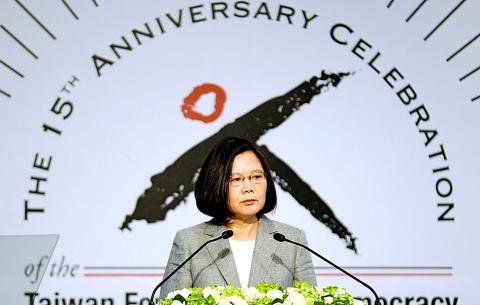President Tsai Ing-wen (蔡英文) yesterday called on like-minded nations to stand together and take action against anti-democratic forces that have put democracy at the risk of regression, while vowing that Taiwan would never move backward.
“Historical trends do not always favor the forward march of democracy, but in Taiwan, moving backward is not an option,” Tsai said at a Taipei forum titled “Global Solidarity of Democracy in Taiwan” hosted by the Taiwan Foundation for Democracy.
The forum, attended by guests from pro-democracy organizations in countries including Tunisia, India, Japan, South Korea and the US, was held to mark the 15th anniversary of the government-funded foundation.

Photo: Liao Chen-huei, Taipei Times
Tsai said the gathering of so many long-time democracy advocates is not just a celebration, but also a timely opportunity to reflect on the past, present and future of democracy.
“In the 21st century, democracy is in retreat,” said Tsai, citing a report by Freedom that said this year marks the 12th consecutive year of decline in global freedom.
Tsai cited another report by the National Endowment for Democracy, funded largely by the US Congress, which examines how China and Russia use “sharp power” to project their influence.
The report says that “authoritarian regimes are exercising sharp power to take advantage of our free and open societies, promote alternative agendas, control and censor information, and undermine our democracies,” Tsai said.
Taiwan is on the frontline of a battle that is taking place here, in Australia, the US, Europe and in like-minded countries all over the world, she said.
“Over the past two years, we have faced increasing pressure from China as they threaten our democratic way of life and limit our international space,” she said.
These anti-democratic forces will proliferate if like-minded countries do not stand and act together, she said.
“It is only if like-minded countries work together — and stand together — that we can fight against unwanted economic, political or military coercion, and defend the values we hold dear,” she added.
Tsai made similar remarks in an interview with Agence France-Presse yesterday.
In the interview, she called on the international community to “constrain” China by standing up for freedoms, and urged other nations to unite with Taiwan in defending against Beijing’s expansionist aims and to protect shared liberal values.
“This is not just Taiwan’s challenge, it is a challenge for the region and the world as a whole, because today it’s Taiwan, but tomorrow it may be any other country that will have to face the expansion of China’s influence,” Tsai said. “Their democracy, freedom and freedom to do business will one day be affected by China.”
“We need to work together to reaffirm our values of democracy and freedom in order to constrain China and also minimize the expansion of their hegemonic influence,” she added.
She added that Taiwan had seen growing support from the US.
The warming relationship comes as Taiwan tries to boost its homegrown defense force.
“In the face of China’s threats we feel the need for us to improve self-defense capabilities,” she said.

An essay competition jointly organized by a local writing society and a publisher affiliated with the Chinese Communist Party (CCP) might have contravened the Act Governing Relations Between the People of the Taiwan Area and the Mainland Area (臺灣地區與大陸地區人民關係條例), the Mainland Affairs Council (MAC) said on Thursday. “In this case, the partner organization is clearly an agency under the CCP’s Fujian Provincial Committee,” MAC Deputy Minister and spokesperson Liang Wen-chieh (梁文傑) said at a news briefing in Taipei. “It also involves bringing Taiwanese students to China with all-expenses-paid arrangements to attend award ceremonies and camps,” Liang said. Those two “characteristics” are typically sufficient

A magnitude 5.9 earthquake that struck about 33km off the coast of Hualien City was the "main shock" in a series of quakes in the area, with aftershocks expected over the next three days, the Central Weather Administration (CWA) said yesterday. Prior to the magnitude 5.9 quake shaking most of Taiwan at 6:53pm yesterday, six other earthquakes stronger than a magnitude of 4, starting with a magnitude 5.5 quake at 6:09pm, occurred in the area. CWA Seismological Center Director Wu Chien-fu (吳健富) confirmed that the quakes were all part of the same series and that the magnitude 5.5 temblor was

The brilliant blue waters, thick foliage and bucolic atmosphere on this seemingly idyllic archipelago deep in the Pacific Ocean belie the key role it now plays in a titanic geopolitical struggle. Palau is again on the front line as China, and the US and its allies prepare their forces in an intensifying contest for control over the Asia-Pacific region. The democratic nation of just 17,000 people hosts US-controlled airstrips and soon-to-be-completed radar installations that the US military describes as “critical” to monitoring vast swathes of water and airspace. It is also a key piece of the second island chain, a string of

The Central Weather Administration has issued a heat alert for southeastern Taiwan, warning of temperatures as high as 36°C today, while alerting some coastal areas of strong winds later in the day. Kaohsiung’s Neimen District (內門) and Pingtung County’s Neipu Township (內埔) are under an orange heat alert, which warns of temperatures as high as 36°C for three consecutive days, the CWA said, citing southwest winds. The heat would also extend to Tainan’s Nansi (楠西) and Yujing (玉井) districts, as well as Pingtung’s Gaoshu (高樹), Yanpu (鹽埔) and Majia (瑪家) townships, it said, forecasting highs of up to 36°C in those areas